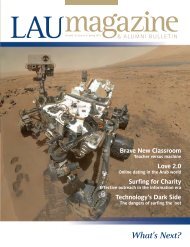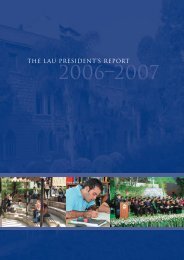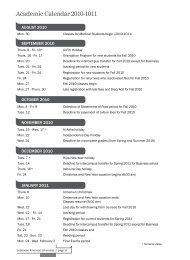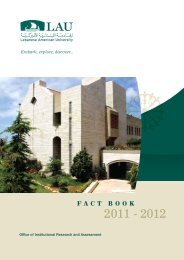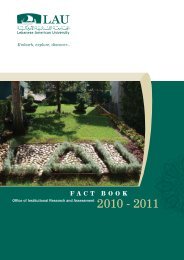academic-catalog2011.. - LAU Publications - Lebanese American ...
academic-catalog2011.. - LAU Publications - Lebanese American ...
academic-catalog2011.. - LAU Publications - Lebanese American ...
Create successful ePaper yourself
Turn your PDF publications into a flip-book with our unique Google optimized e-Paper software.
Department of Social Sciences<br />
EDUCATIONAL OBJECTIVES<br />
1. Prepare the students for the job market by<br />
adding to their majors through a minor in<br />
political science/international affairs.<br />
2. Enhance the political and global knowledge<br />
of students who are not majoring in<br />
political science-international affairs.<br />
3. Develop students’ research and writing<br />
skills through active learning and the<br />
promotion of critical thinking.<br />
4. Provide a strong political scienceinternational<br />
affairs background for<br />
students majoring in many disciplines,<br />
such as Education, Psychology, Social<br />
Work, English Literature, Communication<br />
Arts, etc.<br />
5. Challenge students and faculty to improve<br />
the learning process.<br />
6. Prepare students who are not majoring in<br />
political science/international affairs to<br />
join the MA program in International Affairs<br />
at <strong>LAU</strong> after completing the BA.<br />
7. Expand outreach and engagement by<br />
encouraging faculty and students to<br />
contribute to the community at large.<br />
LEARNING OUTCOMES<br />
1. Understand the nature of government<br />
processes, the function of political<br />
systems, the structures and roles of<br />
institutions and constitutions, theories<br />
of international relations, the role and<br />
functions of international organizations,<br />
the nature of international law, foreign<br />
policy, and international relations.<br />
2. Possess the necessary theoretical and<br />
research skills essential for high level<br />
intellectual pursuit.<br />
3. Be able to think creatively and<br />
independently about major issues in<br />
international affairs and transfer these<br />
skills to identify problems, conceptualize<br />
ideas and communicate solutions in various<br />
situations that emerge in the working place.<br />
4. Acquire the ability to find work in<br />
fields relevant to political science and<br />
international affairs.<br />
5. Obtain a sufficient grasp of the complexities<br />
of modern societies.<br />
REQUIREMENTS<br />
For a minor in Political Science and International<br />
Affairs students must choose 18 credits of the<br />
following courses:<br />
Minor Core Requirements (9 credits)<br />
POL 201 Introduction to Political Science<br />
POL 313<br />
POL 421<br />
Concepts of International Relations<br />
The Middle East in International Affairs<br />
Minor Elective Requirements (9 credits)<br />
POL 221 Comparative Politics of the Major Powers<br />
POL 321 Politics of the Developing Areas<br />
POL 322 Foreign Policy of the Major Powers<br />
POL 323 Middle East Governments and Politics<br />
POL 331 International Organization<br />
POL 332 Public International Law<br />
MINOR IN PSYCHOLOGY<br />
PROGRAM MISSION STATEMENT<br />
The mission of a minor in psychology is to<br />
complement students’ major field of study with<br />
knowledge and experience that will enhance<br />
their understanding of human behavior and<br />
interdisciplinary inquiry.<br />
PROGRAM OBJECTIVES<br />
The general objectives of the minor are to:<br />
1. Provide students with a general view<br />
of the discipline of psychology and its<br />
subspecialties.<br />
2. Equip students from other majors with<br />
knowledge in major areas in psychological<br />
studies.<br />
LEARNING OUTCOMES<br />
Upon successful completion of the program:<br />
1. Students will become familiar with the<br />
main approaches/subfields in psychology<br />
including, social, physical, organizational,<br />
learning, clinical, developmental,<br />
neurological and cultural.<br />
2. Students will become aware of some of the<br />
following knowledge areas:<br />
• Developmental; as related to each<br />
major period of life, infancy, childhood,<br />
adolescence, adulthood, and old age.<br />
• Brain and learning; as related to<br />
biological bases of behavior and<br />
learning and as linked to three major<br />
theories of behaviorism, cognition, and<br />
social cognitive learning.<br />
• Social and Organizational; as applied to<br />
behavior of individuals in groups and in<br />
organizations.<br />
• Applied Psychology; as associated with<br />
symptomatology, possible etiology,<br />
and proposed treatment for the major<br />
ACADEMIC CATALOG [ 2011-2012 ] SCHOOL OF ARTS AND SCIENCES<br />
195




